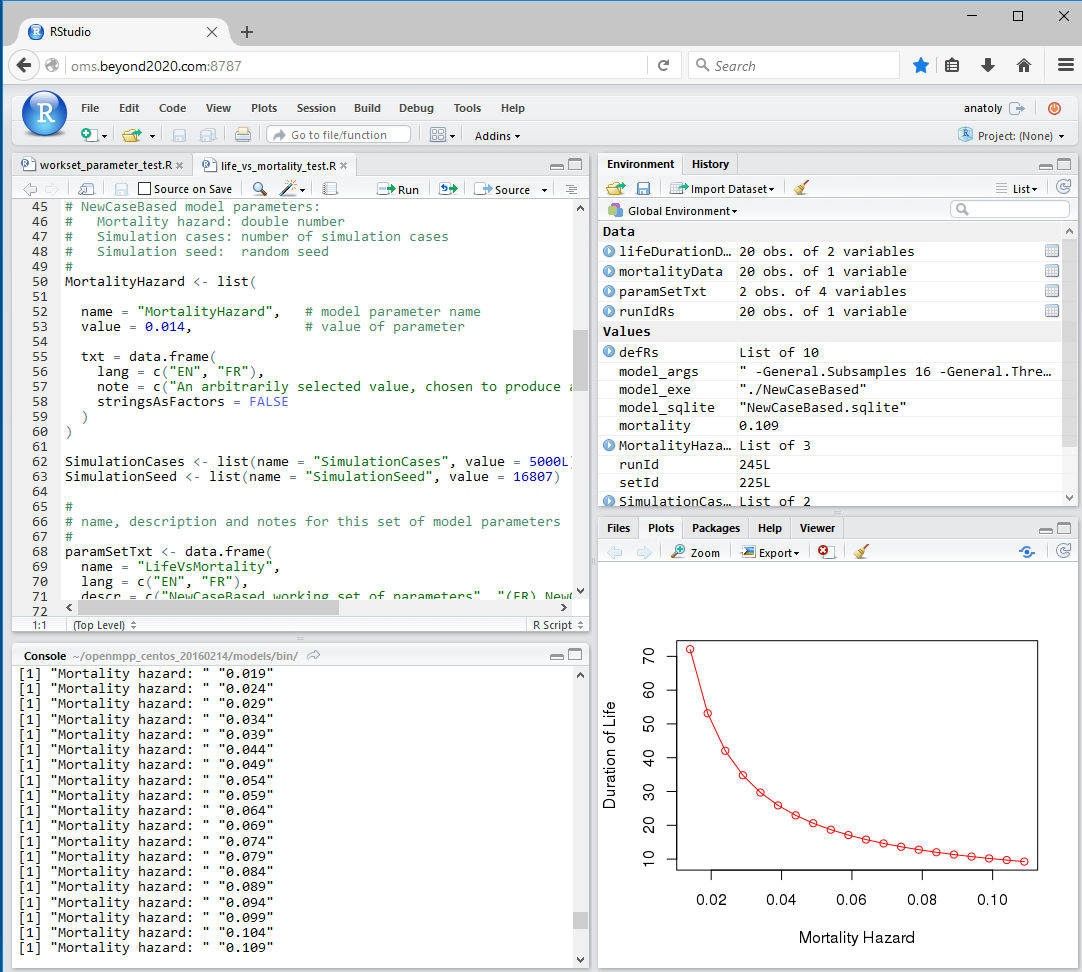Run Model from R - openmpp/openmpp.github.io GitHub Wiki
It is a convenient to use GNU R to prepare model parameters and analyze output values. There are two different R APIs which we can use for openM++ models:
- openMpp package: simple and convenient specially for desktop users, upstream and downstream analysis;
-
omsJSON web-service API: preferable choice to run models on computational clusters and in cloud.
Below is a simple loop example to run NewCaseBased model on desktop using openMpp R package.
There is similar example how to run model in cloud and save results in CSV file using oms JSON web-service.
OpenM++ provides R package openMpp to simplify access to openM++ database for R developers. To find out more about openMpp R package please check:
There is also an excelent R package created by Matthew T. Warkentin available at: mattwarkentin.github.io/openmpp.
Following R example is running openM++ "NewCaseBased" test model with 16 subsamples using mortality hazard data:
mortalityData <- data.frame(
value = seq(from = 0.014, by = 0.005, length.out = 20)
)As result Mortality Hazard increases about eight times in the range of [0.014, 0.109] and we can see eight time decrease of Duration of Life from initial 72 years down to 9 years.

# use openMpp library for openM++ database access
library(DBI)
library("openMpp")
library("RSQLite")
#
# R integration example using NewCaseBased model
# loop over MortalityHazard parameter
# to analyze DurationOfLife
#
##################################################################
# To run this example please uncomment and/or change values below
# to match your hardware and file system environment:
#
# model_exe <- path to the model executable, i.e.: "./NewCaseBased" or "NewCaseBased.exe"
# model_sqlite <- path to the model.sqlite database: "NewCaseBased.sqlite"
# model_args <- optional arguments to control model run, for example:
# -OpenM.SubValues 16 <- number of simation members
# -OpenM.Threads 4 <- number of computatinal threads
#
### For running on a local machine using the working directory in R
#
# For the following values to work, you must first set the R Working directory
# to the directory containing the NewCaseBased executable and the SQLite database.
# In RStudio Session > Set Working Directory > Choose Directory,
# then navigate to location, e.g.: /OM_ROOT/models/NewCaseBased/ompp/bin
# Alternatively, one may use setwd(), e.g.: setwd("/OM_ROOT/models/NewCaseBased/ompp/bin")
#
model_exe = "./NewCaseBased"
model_sqlite = "NewCaseBased.sqlite"
model_args = " -OpenM.SubValues 16 -OpenM.Threads 4"
# model_args = " " # default: 1 simulation member and 1 thread
#
### For running on a local machine using explicit paths
#
# model_exe = "/path/to/executable/model/NewCaseBased"
# model_sqlite = "/path/to/SQLite/database/NewCaseBased.sqlite"
#
### For running on cluster (change to match your cluster)
#
# model_exe = "mpiexec"
# model_sqlite = "/mirror/NewCaseBased.sqlite"
# model_args = "-n 8 /mirror/NewCaseBased -OpenM.SubValues 16 -OpenM.Threads 2"
##################################################################
#
# NewCaseBased model parameters:
# Mortality hazard: double number
# Simulation cases: number of simulation cases
# Simulation seed: random seed
#
MortalityHazard <- list(
name = "MortalityHazard", # model parameter name
value = 0.014, # value of parameter
txt = data.frame(
lang = c("EN", "FR"),
note = c("An arbitrarily selected value, chosen to produce a life expectancy of about 70 years", NA),
stringsAsFactors = FALSE
)
)
SimulationCases <- list(name = "SimulationCases", value = 5000L)
SimulationSeed <- list(name = "SimulationSeed", value = 16807)
#
# name, description and notes for this set of model parameters
#
inputSet <- data.frame(
name = "LifeVsMortality",
lang = c("EN", "FR"),
descr = c("NewCaseBased working set of parameters", "(FR) NewCaseBased working set of parameters"),
note = c(NA, NA),
stringsAsFactors = FALSE
)
#
# connect to database and find NewCaseBased model
#
theDb <- dbConnect(RSQLite::SQLite(), model_sqlite, synchronous = "full")
invisible(dbGetQuery(theDb, "PRAGMA busy_timeout = 86400")) # recommended
defRs <- getModel(theDb, "NewCaseBased") # find NewCaseBased model in database
# create new working set of model parameters based on existing model run results
#
firstRunId <- getFirstRunId(theDb, defRs)
setId <- createWorksetBasedOnRun(
theDb, defRs, firstRunId, inputSet,
MortalityHazard, SimulationCases, SimulationSeed
)
if (setId <= 0L) stop("workset creation failed")
setReadonlyWorkset(theDb, defRs, TRUE, setId) # workset must be read-only to run the model
#
# analyze NewCaseBased model varying mortality hazard values
#
mortalityData <- data.frame(
value = seq(from = 0.014, by = 0.005, length.out = 20)
)
for (mortality in mortalityData$value)
{
print(c("Mortality hazard: ", mortality))
system2(
model_exe,
paste(
model_args,
" -Parameter.MortalityHazard ", mortality,
" -OpenM.SetId ", setId,
" -OpenM.LogToConsole false",
" -OpenM.LogToFile true",
" -OpenM.ProgressPercent 100",
sep = ""
)
)
}
#
# read final results from database
# average duration of life: DurationOfLife.Expr3
#
runIdRs <- getWorksetRunIds(theDb, setId) # get result id's
lifeDurationData <- NULL
for (runId in runIdRs$run_id)
{
lifeDurationData <- rbind(
lifeDurationData,
selectRunOutputValue(theDb, defRs, runId, "DurationOfLife", "Expr3")
)
}
dbDisconnect(theDb) # close database connection
#
# display the results
#
plot(
mortalityData$value,
lifeDurationData$expr_value,
type = "o",
xlab = "Mortality Hazard",
ylab = "Duration of Life",
col = "red"
)